The following types of conference awards are made:
OB Division AOM Meeting Best Paper Award
Sponsored by SAGE Publications on behalf of Group & Organization Management
This award recognizes the empirical and/or conceptual paper submitted to the Academy of Management meeting that offers the most significant contribution to the field of OB.
The 2025 recipients are
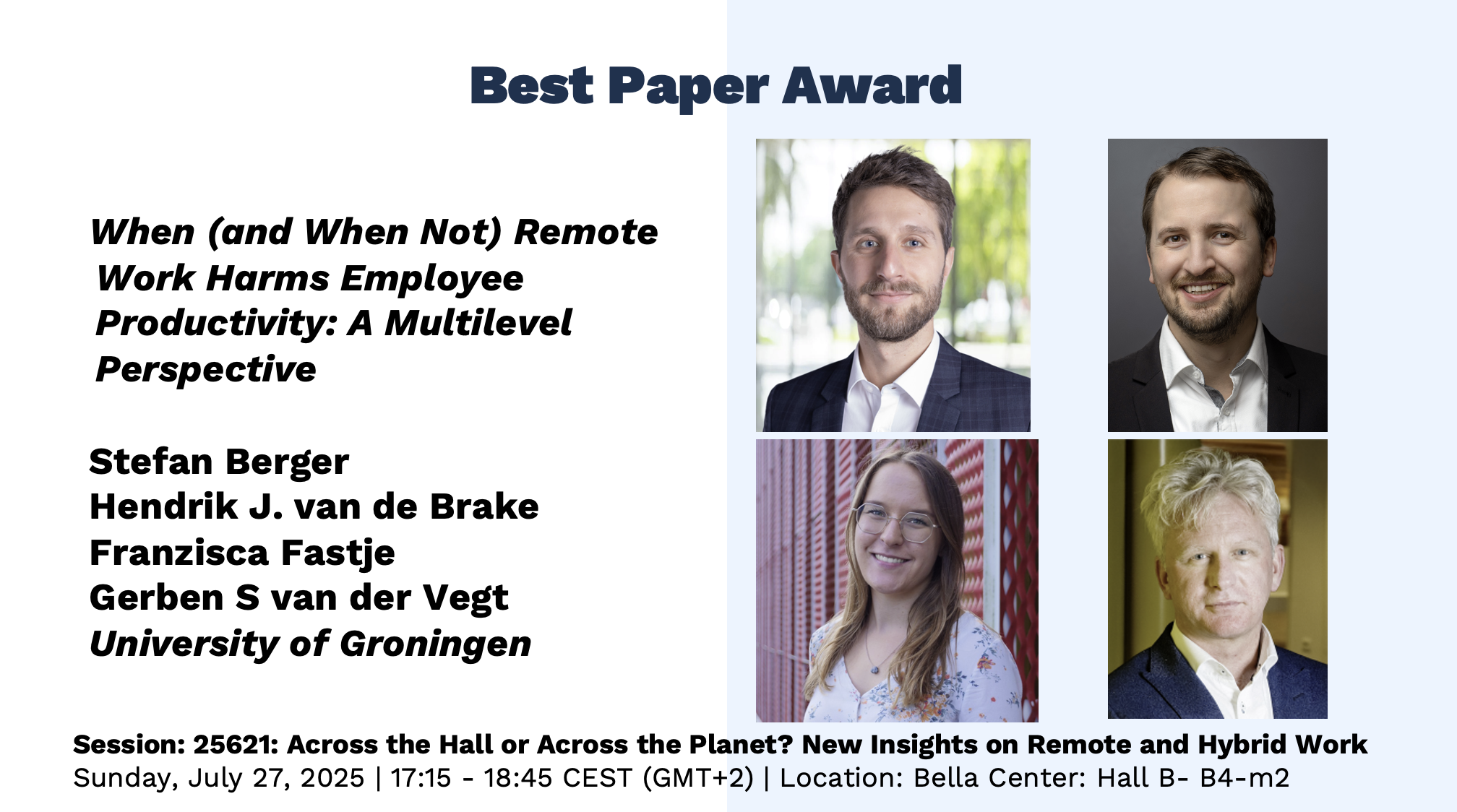
Award winners by year
- 2024 Hui Liao (University of Maryland), Yasha Spriha (University of Maryland), Qiang Feng (University of International Business and Economics), Li Zhu (Peking University), and Zhengyi Zhao (Beijing Information Science and Technology University), for "Visible from Afar: Remote Employees’ Collaboration Responsiveness to Managerial Requests."
- 2023 Kun Luan (Zhejiang University) for "The Hedges Have Eyes: Third-party Evaluation of Social Networking in Organizations."
- 2022 Lukas Lanz (WHU Otto Beisheim School of Management), Roman Briker (Maastricht University) and Fabiola Heike Gerpott (WHU - Otto Beisheim School of Management) for “Adherence to Unethical Instruction from AI Supervisors: Combining Experiments with Machine Learning”
- 2021 Timothy Kundro (Wharton) and Nancy Rothbard (Wharton)
- 2020 Zhaopeng Liu (Antai College of Economics and Management, Shanghai Jiao Tong University.), Chao Chen (Rutgers University), Zhen Zhang (Southern Methodist University), and Mo Chen (University of Science and Technology of China) for “Newcomers’ Slippery Slope of Unethical Pro-Organizational Behavior: The Normalization Perspective.”
- 2019 Taryn Stanko (Cal Poly), Patricia Dahm (Cal Poly), Brooke Lahneman (Montana State University), and Jonathon Richter (University of Oregon) for “Navigating an identity playground: An exploration of work identity and routines in a virtual world.”
- 2018 Johnathan Cromwell (University of San Francisco) for “Further Unpacking Creativity with a Problem-Space Theory of Creativity and Constraint”
- 2017 Merideth Thompson (Utah State University), Dawn Carlson (Baylor University), Marcus Butts (Southern Methodist University), Sally Weaver (McLennan County Medical Education and Research Foundation; Heart of Texas Family Health Center) for "The Cost Of Work’s Tense Triad On Employee Healthcare Utilization"
- 2016 Elijah Wee (Maryland), Rellie Derfler-Rozin (Maryland), and Jennifer Carson Marr (Georgia Tech) for "Jolted into Dominance or Prestige? How Jolts to Groups Affect Status-Striving and Status Conferral"
- 2015 Zhenyu Liao (National U. of Singapore), Lusi Wu (Purdue Univ), Zhaoli Song (National U. of Singapore), Xian Li (National U. of Singapore), Ying Liu Renmin (U of China) for their paper "Leader-member exchange process: The mediating roles of state gratitude and momentary trust in leader"
- 2014 Kai Chi Yam (University of Washington), Anthony Klotz (Oregon State University), Wei He (Huazhong University of Science & Technology), and Scott Reynolds (University of Washington) for "Turning Good Soldiers into Bad Apples: Examining When and Why Citizenship Behavior Leads to Deviance"
- 2013 Vijaya Ventakaramani (University of Marlyand), Andreas W. Richter (University of Cambridge) and Ronald Clarke (University of Valencia) for "Maneuvering the Upper Echelon for Employee Creativity: The Role of Team Leaders' Social Network Ties"
- 2012 Frederic Godart, William Maddux, Andrew Shipilov (all INSEAD) and Adam Galinsky (Northwestern University) for "A flair for fashion: Professional multicultural experiences and creative performance"
- 2011 John Trougakos, Ivona Hideg and Bonnie Cheng (all University of Toronto) for "Lunch breaks unpacked: The effects of daily lunch break activities and control over break on fatigue"
- 2010 Daniel Cable and Virginia Kay (all University of North Carolina, Chapel Hill) for "Striving for self-verification during organizational entry"
- 2009 Dina Van Dijk (Ben Gurion University of the Negev) and Avraham Kluger (Hebrew University of Jerusalem) for “Does task type moderate the effect of feedback sign on motivation and performance?”
- 2008 Ariane Ollier-Malaterre (Boston College) for "Contributions of work-life and resilience initiatives to the individual/organization relationship"
- 2007 Adam Barsky (University of Melbourne)
- 2006 Glen Kreiner, Elaine Hollensbe & Matthew Sheep
- 2005 Michael Johnson & Fred Morgeson
- 2004 Guillermo E. Dabos and Denise M. Rousseau (Carnegie Mellon University)
- 2003 Daniel Ames, Francis Flynn, and Elke Weber (all Columbia University)
- 2002 Ya-Ru Chen (New York University), Gerald Greenberg (Ohio State University) and Joel Brockner (Columbia University)
- 2001 Robert Eisenberger and Linda Rhoades (both University of Delaware)
- 2000 Cynthia Fisher and Christopher Nobel (both Bond University, Australia)
- 1999 Charles A. O’Reilly III, Katherine Y. Williams (both Stanford University), and Sigal Barsade (Yale University)
- 1998 Allan Lind, Jerry Greenberg, Kimberly Scott, and Thomas Welchans
- 1998 Robert Folger, Sandra Robinson, Jorg Dietz, Judi McLean Parks, and Robert Baron
- 1996 Avraham Kluger and Angelo DeNisi for "The effects of feedback interventions on performance: A historical review, a meta-analysis, and a preliminary feedback intervention theory"
OB Division AOM Meeting Best Symposium Award
Sponsored by Wiley-Blackwell on behalf of Personnel Psychology
This award recognizes the symposium on the program that best exemplifies interesting, important, and high-impact research.
The 2025 recipient is
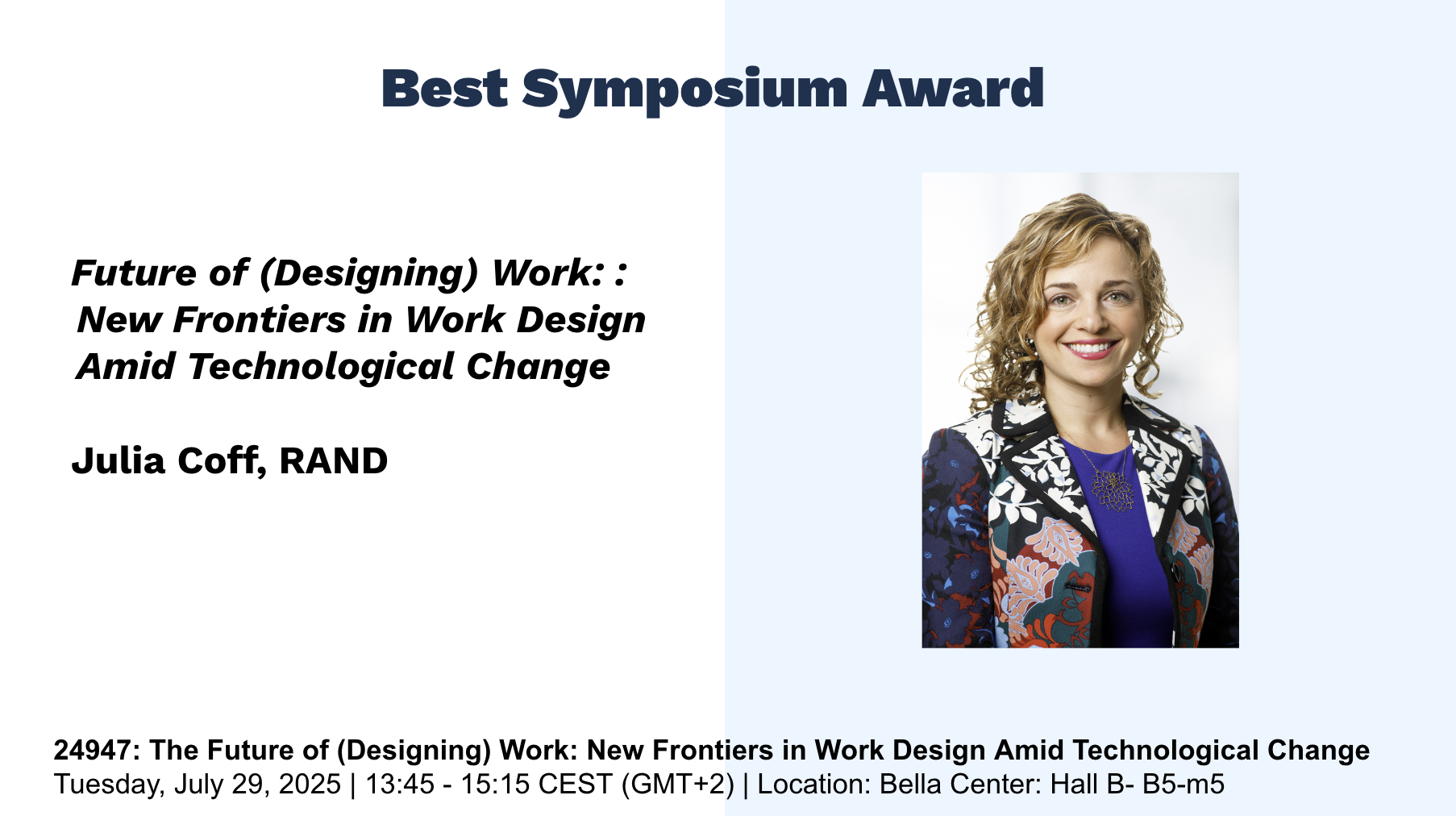
Award winners by year
- 2024 Daria Morozova (Leiden University) for “Humanness and Advanced Technologies in Organizations: On Being Truly Human While Working with Artificial Intelligence.”
- 2023 Sophia Pink (U. of Pennsylvania) and Linda Chang (U. of Pennsylvania) for “New Perspectives on Increasing Diversity, Equity, and Inclusion”
- 2022 Shawn Xiaoshi Quan (U. of Washington) for “Social Class and Class Inequality in Organizations: Facing and Fighting Classism in the Workplace”
- 2021 Vivian Xiao (Stanford University)
- 2020 Olivia A. Foster-Gimbel (New York University Stern School of Business) and Amelia Stillwell (Stanford Graduate School of Business) for "Observers, Offenders, and Allies: New Insights on Men’s Roles in the Post #MeToo Era."
- 2019 Jorge Walter (George Washington University) and Daniel Levin (Rutgers) for “The role of memory and cognition (vs. activity and behavior) in social networks.”
- 2018 Rachel Lise Ruttan (Washington University in St. Louis) and Katrina Fincher (Columbia Business School) for “She Said “Me, Too,” He said “Not Me:” A Situationist Perspective on Sexual Harassment.”
- 2017 Zhiya (Alice) Guo and Nicholas A. Hays (both from Michigan State University) for "Interfacing Hierarchies: Investigating the Confluence of Multiple Hierarchies"
- 2016 Julia Lee (Michigan) and Ting Zhang (Harvard) for "Behavioral Ethics at Work: A Move Towards Developing Interventions that Mitigate Unethicality"
- 2015 Madeline Ong (Univ. of Michigan), Tyler G. Okimoto (U. of Queensland), Linda K. Trevino (U. of Pennsylvania) for their symposium "Offender Morality in the Aftermath of Wrongdoing"
- 2014 Yurianna Kim (University of Texas, Austin) for "The Power of Speaking Up in Organizations: An Exploration of Outcomes of Voice"
- 2013 Marie S. Mitchell (University of Georgia) for "Theoretical and Empirical Developments on Motives of (Un)ethical Decision Making and Behavior"
- 2012 Elizabeth Rouse and Spencer Harrison (both Boston College) for "Creating together: Exploring the social dynamics of creativity"
OB Division AOM Meeting Best Paper with International Implications Award
Sponsored by Macquarie University
This award recognizes the paper whose theme and content best reflects an awareness of business and management across national boundaries.
The 2025 recipients are
Decoding Job Embeddedness: Meta-Analysis on Consequences and Unveiling Moderating Forces.
Lijun Wang, Wuhan University of Technology, Jing Li and Meng Zhang, Hebei University of Economics and Business
Award winners by year
- 2024 Deeviya Francis Xavier (University of Vienna), Christian Korunka (University of Vienna), and Roni Reiter-Palmon (University of Nebraska Omaha), for “The Impact of AI Integration on Job Autonomy and Creative Self-Efficacy: A Cultural Perspective”
- 2023 Sebastian Koos (U. of Konstanz), Florian Kunze (U. of Konstanz), and Benjamin Korman (U. of Konstanz) for “How Political Context Affects Immigrants' Social Contact Dynamics and Mental Health at Work”
- 2022 Benjamin Korman (U. of Konstanz), Florian Kunze (U. of Konstanz), Max Reinwald (LMU Munich), and David Dwertmann (Rutgers U.) for “The Effect of Community Support for Far-Right Political Parties on Immigrant Employees' Absenteeism”
- 2021 Marie-Colombe Afota (IESEG School of Management), Yanick Provost Savard (University of Quebec, Montreal), Ariane Ollier-Malaterre (University of Quebec, Montreal) and Emmanuelle Andree Leon (ESCP Business School).
- 2020 Yi Wang (Pennsylvania State University), Zitong Sheng (Future of Work Institute, Curtin University, Australia), Hanyi Min (University of Central Florida), and Bart de Jong (Australian Catholic University) for "What Drives Employees’ Trust at Work? A Meta-Analysis of Antecedents Across Referents and Culture."
- 2019 David Dwertmann (Rutgers) and Florian Kunze (University of Konstanz) for “More than meets the eye: The critical role of migrant status for social identity effects”
- 2018 Lars Alkærsig (Technical University of Denmark), Julia Kensbock (Maastricht University), and Carina Lomberg (Technical University of Denmark) for “The Burnout Epidemic—How Burnout Spreads Across Organizations”
- 2017 An-Chih Wang (National Sun Yat-sen University in Taiwan) for "Developmental leadership: How Chinese leaders integrate control and care to cultivate subordinates"
- 2016 Ronald Fischer (Victoria University of Wellington), Maria Cristina Ferreira (Salgado de Oliveira University), Kubilay Gok (Winona State University), Nathalie van Meurs (Middlesex University), Ding-Yu Jiang (National Chung Cheng University), Donna Achmadi (Canterbury District Health Board), Ma. Socorro Mendoza (UBHC Rutgers University), Arif Hassan (International Islamic University Malaysia), Johnny Fontaine (Ghent University), Charles Harb (American University of Beirut), Mustapha Achoui (Arab Open University), Andrew Mogaji (Benue State University) and Jan Cieciuch (University of Zurich) for "Cultural Uncertainty as Moderator of the Organizational Formalization Puzzle"
- 2013 Jian Liang, Xu Huang, and Zhen Xiong Chen (all Shanghai Jiao Tong University) for "Why Offering Participative Opportunities Does Not Necessarily Facilitate Speaking Up"
- 2012 Dong Liu (Georgia Institute of Technology) for "Leading up: A cross-cultural, longitudinal, and multilevel investigation of TMT support and shocks"
- 2011 Ruodan Shao and Daniel Skarlicki (both University of British Columbia) for "Employee sabotage associated with customer injustice: A comparison of North America and East Asia"
- 2010 Xiaomeng Zhang (American University), Yuan Yi Chen (Hong Kong Baptist University), Ho Kwong Kwan (Drexel University) for "Empowering leadership and team creativity: The roles of team learning and team creative efficacy"
- 2009 Gilad Chen (University of Maryland), Bradley Kirkman (Texas A&M University), Kwanghyun Kim (California State University, East Bay), and Crystal Farh (University of Maryland) for “Expatriate motivation and effectiveness: The roles of cultural distance and subsidiary support.”
- 2008 Heather MacDonald (University of Waterloo), Douglas Brown (University of Waterloo), and Lorne Sulsky (Wilfrid Laurier University) for "A cross-cultural examination of the motivational differences in feedback seeking"
- 2007 Diya Das, Ravi Dharwadkar and Pamela Brandes for their paper "Importance of being something: Identity centrality and work outcomes in offshored call centers in India.”
- 2006 Yih-teen Lee & John Antonakis
- 2005 Christopher Robert & Wan Yan
- 2005 Michael Cole, Heike Bruch, & Bernd Vogel
OB Division AOM Meeting Outstanding Practical Implications for Management Paper Award
Sponsored by the Organizational Behavior Division
This award is given to the conference paper with the strongest practical implications for management.
The 2025 recipient is
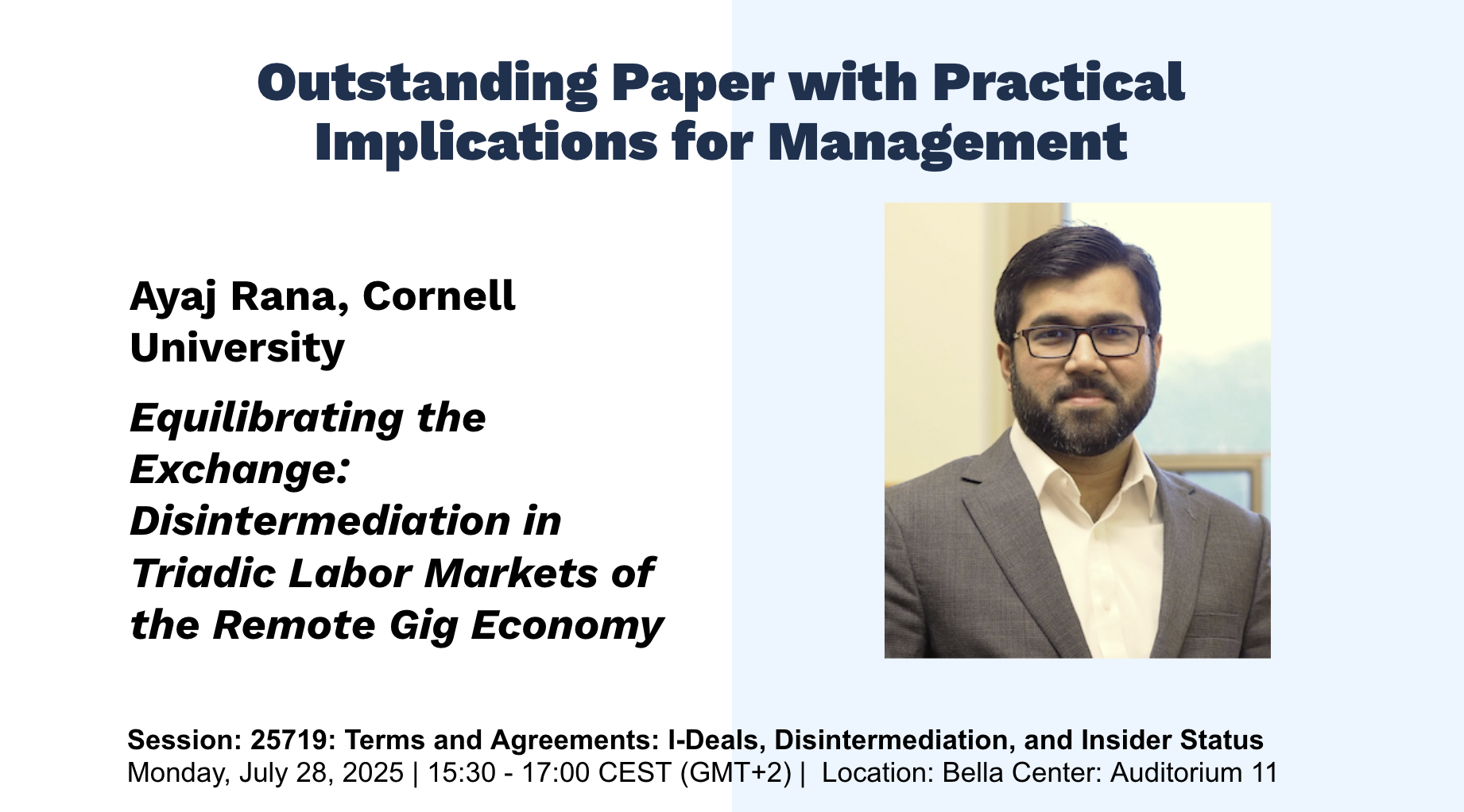
Award winners by year
- 2024 Yingyue Luna Luan (University of Cambridge) and Yeun Joon Kim (University of Cambridge) for “Is Helping My Job?: The Bright and Dark Sides of Helping-Inclusive HR Practice for Employee Helping”
- 2023 Tanya Yuan Tian (New York U.), Linhui Wu (U. of Minnesota), and Julia Hur (New York U.), for “Money Cannot Be Green: Performance Incentives, Attention to Money, and Organizational Sustainability”
- 2022 Bonnie Cheng (U. of Hong Kong), Jun Xu (Xi'an Jiaotong U.), Kan Ouyang (Shanghai U. of Finance and Economics), Amy Y. Ou (Hong Kong Polytechnic) and Daniel McAllister (National U. of Singapore) for “Daily Lunch Break Profiles and Work-Related Outcomes for Working Mothers”
- 2021 Steven Charlier (Chair), Kylie Rochford, Katrina Graham, Ece Tuncel, Gabe Adams and Dana Sumpter
- 2020 Kristin Bain (Rochester Institute of Technology), Kathryn A. Coll (University of Utah), Elizabeth R. Tenney (David Eccles School of Business, University of Utah), and Tamar Admati Kreps (Shidler College of Business, University of Hawaii at Manoa). for "Battling Incivility: Increasing Willingness to Voice through Amplification."
- 2019 Mayowa Babalola (United Arab Emirates University), Shuang Ren (Deakin University), Patrick Raymund James M. Garcia (Macquarie University), Kubilay Gok (Winona State University), Liang Guo (Shandong University at Weihai) for “Stronger together: Understanding how to prevent, reduce, or eliminate abusive supervision at work”
- 2018 Ayelet Fishbach (University of Chicago) and Lauren Eskreis-Winkler (Wharton) for “Hidden Failures”
- 2017 Elijah Wee (University of Washington), Vijaya Venkataramani (University of Maryland), for "How Ideas Come to Life: Effect of Role and Context On Supervisory Sponsorship"
- 2016 David DeGeest (Groningen), Thom de Vries (Groningen) and Gerben van der Vegt (Groningen) for "The Duality of Boundary Spanning: Its Positive and Negative Effects on Team Effectiveness"
- 2015 Sooyeol Kim, Youngah Park and Lucille Headrick (all from University of Illinois at Urbana-Champaign) for their paper "Employees’ Micro-Break Activities and Job Performance: An Examination of Telemarketing Employees"
- 2014 Peter Desmet, Niek Hoogervorst, Marius van Diijke (all from Erasmus University) for "Prophets vs. Profits: How Market Competition Influences Leaders’ Disciplining Behaviors"
- 2013 Ingrid Chadwick and Jana Raver (both Queen's University) for "Continuously improving in tough times: Overcoming resource constraints with psychological capital"
- 2012 Melissa Valentine (Harvard University) for "Team scaffolds: How minimal in-group structures support fast-paced teaming"
- 2011 Alicia Grandey (Pennsylvania State University), Lori Goldberg (Personnel Decisions International), and Douglas Pugh (Virginia Commonwealth University) for "Employee satisfaction, responsiveness, and customer satisfaction: Linkages and boundary conditions"
- 2010 Daniel Cable and Virginia Kay (all University of North Carolina, Chapel Hill) for "Striving for self-verification during organizational entry"
- 2009 Heidi Gardner (Harvard University) for “Feeling the heat: The effects of performance pressure on teams’ knowledge use and performance.”
- 2008 Long Wang (Northwestern University) for "Money and fame: Vividness effects in the National Basketball Association"
- 2007 Steffen Raub (Ecole Hoteliere De Lausanne) and Chris Robert (University of Missouri)
OB Division AOM Meeting Best Dissertation-Based Paper Award
Sponsored by Wiley-Blackwell on behalf of the Journal of Organizational Behavior
This award recognizes the empirical and/or conceptual paper based on the author or first author’s dissertation, which offers the most significant contribution to the field of OB.
The 2025 recipient is
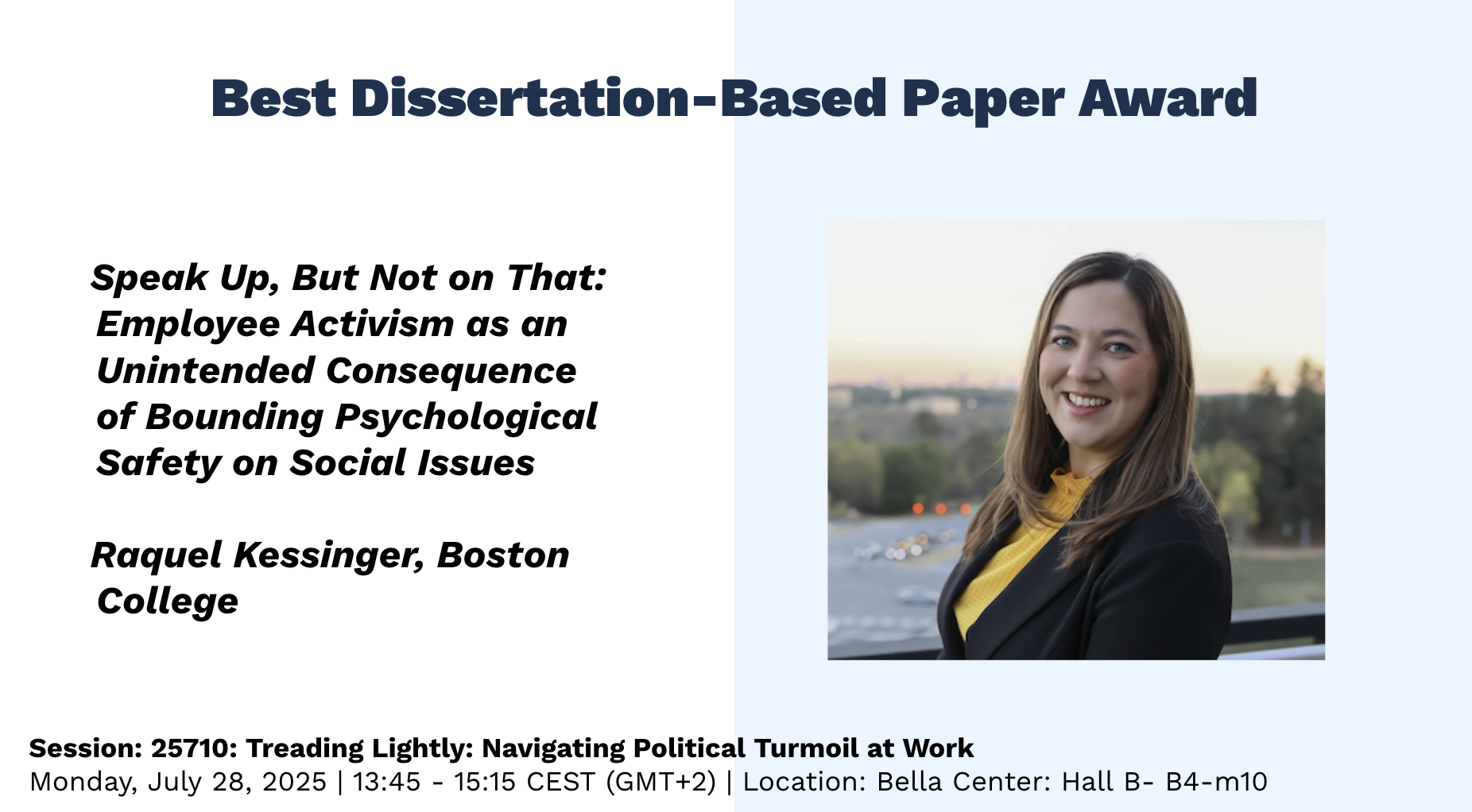
Award winners by year
- 2024 Cheng Chen (University of Groningen), Yingjie Yuan (University of Groningen), Stefan Berger (University of Groningen), and Bernard Nijstad (University of Groningen), for “The Benefits of Redundancy: External Contact Duplication, Information Sharing, and Team Creativity”
- 2023 Rebecca Mitchell (U. of Colorado): “Better than Myself: A Translation and Extension of Internal Comparison Theories in Management”
- 2022 Alentina Vardanyan (University of Cambridge): “Employee-AI Augmented Collaboration: A Qualitative Study of Fashion Designers and Stylists”
- 2021 Semin Park (University of Iowa): “The impact of individual conflict experiences on proximal task performance in a multi-team context” & Lucille Headrick (University of Illinois at Urbana-Champaign): “Firefighters’ Emotional Demands and Off-Duty Unhealthy Behaviors: Social Resources as Moderators”
- 2020 Patrick Tinguely (ETH Zurich), Vivianna Fang He (ETH Zurich), Shiko M. Ben-Menahem (ETH Zurich), and Georg von Krogh (ETH Zurich) for "The Relation between Mentor-Protégé LMX Disagreement and Protégés’ Turnover Intentions."
- 2019 Karim Ginena (University of Virginia) for “Exploring right-vs-right ethical dilemmas: How firefighters experience and manage loyalty tensions”
- 2018 Stefan Berger (University of St.Gallen) for “Multiple Teams, Multiple Roles, Multiple Consequences: Are Polychronics the Better Multiteamers?”
- 2017 Margaret Luciano (Arizona State University) for "Coordination at the Interface: Understanding and Improving Cross-Unit Patient Handoffs"
- 2016 James Lemoine (SUNY University at Buffalo), Terry Blum (Georgia Tech), Daniel Watts (Georgia Tech), and Wesley Kean (Georgia Tech) for "Servant Leadership Transmission and a Female Advantage: Building and Testing a Contingent Theory"
- 2015 Ting Zhang from (Harvard University) for "Back to the beginning: Rediscovering inexperience helps experts give advice"
- 2014 Ethan S. Bernstein (Harvard University) for "Seeing Too Much: Too Much In Sight, Too Little Insight? An Attention-Driven View of Productivity"
- 2013 Dustin Bluhm (University of Colorado) for "Stable versus shifting ethical leadership: The impact on team positivity and performance"
- 2012 H. Colleen Stuart (Carnegie Mellon University) for "A network perspective on membership change: Structural disruption and adaptation in hockey teams"
- 2011 Andrew Knight (Washington University in St. Louis) for "Mood at the midpoint: How team positive mood shapes team development and performance"
- 2010 Colin Fisher (Harvard University) for "Better lagged than never: The lagged effects of process interventions on group decisions"
- 2009 Bradley Owens (University of Washington) for “Humility in organizations: Establishing construct, nomological, and predictive validity”
- 2008 Rebecca Mitchell (University of Newcastle, Australia) for "Knowledge creation in groups with diverse composition"
- 2007 Adam Barsky (University of Melbourne)
- 2006 Seung-Yoon Rhee (KAIST Graduate School of Management)
- 2005 Diane Bergeron
- 2004 Mark Mortensen (McGill University)
- 2003 Violet Ho (National University of Singapore)
- 2002 Brooke Harrington (Brown University)
- 2001 Jonathon Cummings (Carnegie Mellon University )
- 2000 John Austin (University of Washington)
- 1999 Kai Lamertz (Concordia University)
- 1998 Claudia Cogliser (University of Miami)
OB Division AOM Meeting Most Innovative Student Paper Award
Sponsored by SAGE Publications on behalf of the Human Relations
This award recognizes an empirical or conceptual paper led by a student that builds or tests theory in an unusually creative manner, investigates a novel organizational phenomenon, or uses a path-breaking design to illuminate an important problem.
The 2025 recipients are
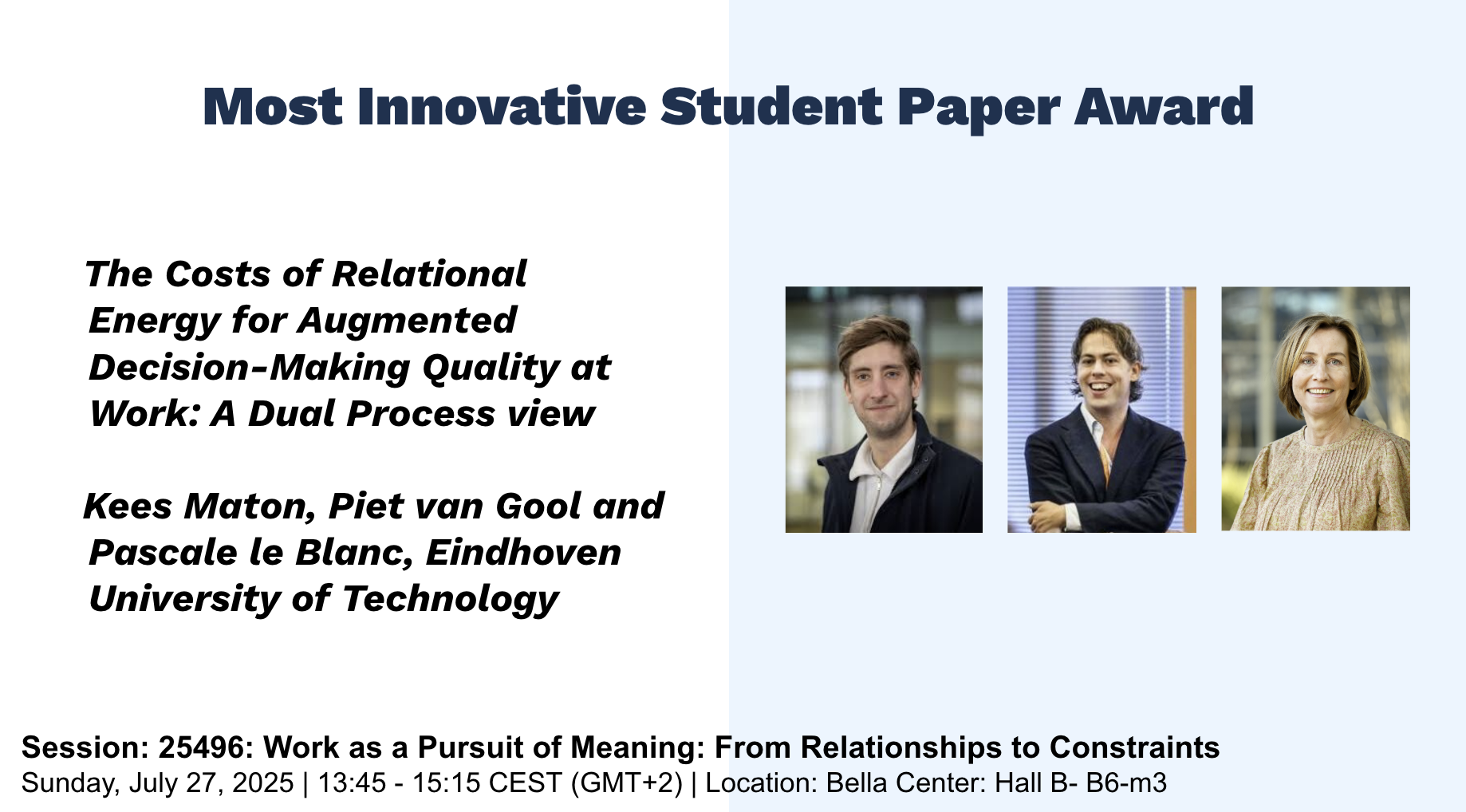
Award winners by year
- 2024 Christopher Winchester (U. of Minnesota) and Amy Bartels (U. of Nebraska, Lincoln), for “Task Allocation Preferences Assemble! A Mixed Methods Extension of Person-Task Fit to the Team Level”
- 2023 Jared Parker Scruggs (U. of Pennsylvania): “Not About the Grind: Emergence and Consequences of Employee Anti-Work Orientation”
- 2022 Audrey Bélanger (HEC Montreal) and Jean-François Harvey (HEC Montreal): “Promoting voice in policing: The role of imagination, centralization, and psychological safety”
- 2021 Moritz Appels (U. Manheim) “The Choice of a Leader: CEO Sociopolitical Activism as a Signal of Authentic leadership.”
- 2020 Salvatore J. Affinito (University of North Carolina at Chapel Hill), Michael Christian (University of North Carolina, Chapel Hill), Elad N. Sherf (University of North Carolina at Chapel Hill, Kenan-Flagler Business School), Jonathan Edward Keeney (University of Notre Dame), Jun Yang (University of North Carolina at Greensboro), David A. Hofmann (University of North Carolina, Chapel Hill), Yu Yu (School of Economics and Management, Tsinghua University), and Kurt Gray (University of North Carolina, Chapel Hill) for "From deviance to cover-up: The roles of confessional silence and punitive policies."
- 2019 Salvatore Affinito (University of North Carolina), Michael Christian (University of North Carolina), Matthew Pearsall (University of North Carolina), Leah Morgan (University of North Carolina), Erin Long (University of Georgia), and Cheryl Jones (University of North Carolina) for “Daily interactions with cynical coworkers affect employee energy and behavior”
- 2018 Ruixue Zhang (Hong Kong University of Science and Technology) and Anran LI (Hong Kong University of Science and Technology) for “The Double-Edged Sword Effect of Team Proactive Personality on Team Performance”
- 2017 Vontrese Deeds (Northwestern University), Rachel Lise Ruttan (Washington University in St. Louis) for "Stated-Lived Value Congruence and Expressive Authenticity"
- 2016 Bradford Baker (Maryland) and Michael Johnson (Washington) for "Economic Consequences of Unethical Behavior: An Organizational Context Model"
- 2015 Rachel Arnett (Harvard Business School) for "What Status? Avoiding High Status Identity Disclosure When Not Shared By Others"
- 2014 Eric Anicich (Columbia University) "When Hierarchy Conquers and When It Kills: The Benefits and Costs of Hierarchical Cultural Values"
- 2013 Elijah Xun Ming Wee with faculty co-author Hui Liao (both University of Maryland) for "Power-Dependency Dynamics And Abusive Supervision: The Roles Of Follower's Balancing Operations And Leader's Trustworthiness"
- 2012 Yuntao Dong and Elizabeth Campbell-Bush (both University of Maryland) with faculty co-authors Hui Liao (University of Maryland), Aichia Chuang (National Taiwan University) and Jing Zhao (Rice University) for "An invisible hand in employee service creativity: Customer empowering behaviors"
- 2011 Sebastiano Massaro with faculty co-author Simcha Jong (both University College, London) for "Managing knowledge-intensive work: A trust based model"
OB Division AOM Meeting Best Professional Development Workshops Award
The 2025 recipients of the PDW Awards are
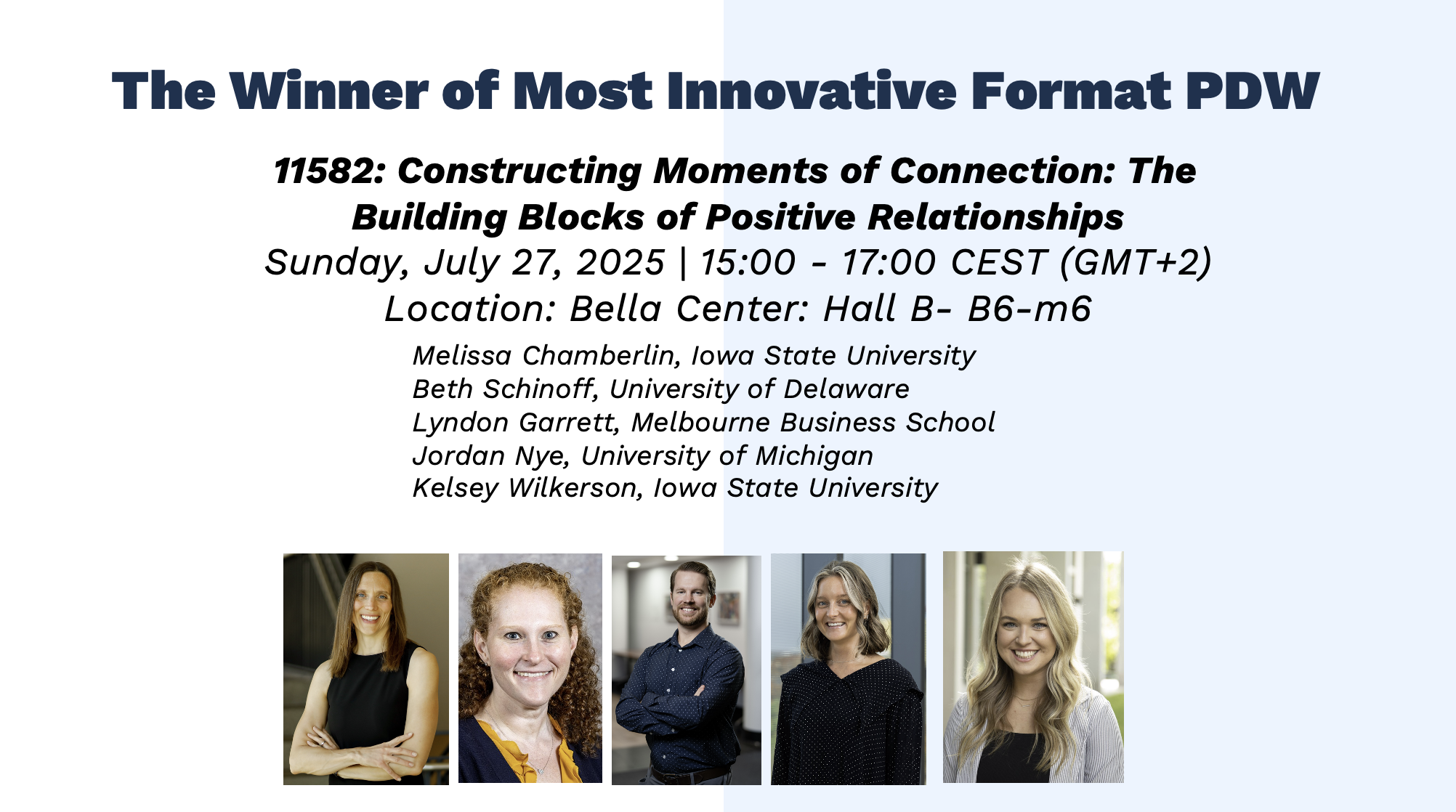
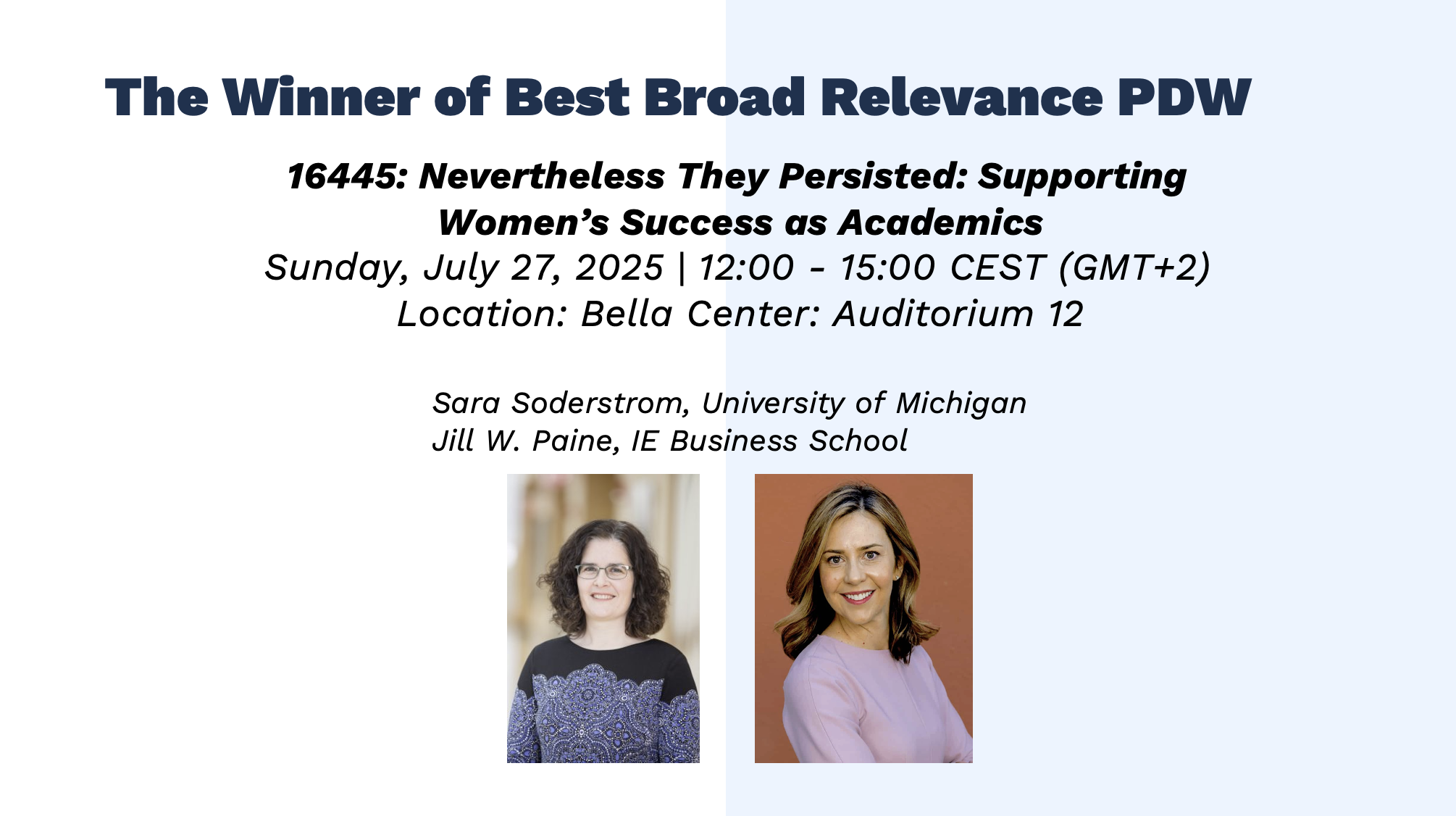

(Retired in 2025) OB Division AOM Meeting Best Paper with Entrepreneurship Implications Award
Sponsored by the Ewing Marion Kauffman Foundation
This award recognizes the paper with the most significant implications for entrepreneurship scholarship in the field of OB.
Award winners by year
- 2024 Michael Lerman (Iowa State University), Melissa Cardon (University of Tennessee), and Sherry Thatcher (University of Tennessee), for “Equity-Splits, Temptations to Quit, and Battles of Wit: Faultline Evolution During New Venture Team Development”
- 2023 Jean-François Harvey (HEC Montréal): “Experimentation and Business-Model Transformation: The Self-Regulatory Benefits of Hype”
(Retired in 2025) OB Division AOM Meeting Best Student Paper with Entrepreneurship Implications Award
Sponsored by the Kaufmann Foundation
This award recognizes the paper in which a student was in the lead role (a student must be the first or sole author), and that has the most significant implications for entrepreneurship scholarship in the field of OB.
Award winners by year
- 2024 Limei Chen (U. of Hong Kong), Chuding Ling (Renmin U. of China), Melody Jun Zhang (The Hong Kong Polytechnic U.), and Nan Wang (Lingnan U.), for “Team Formation Strategy and Entrepreneurial Effectiveness: A Dynamic Ambidexterity Perspective”
- 2023 Minah Park (U. of Wisconsin-Madison), Jonathan Thomas Eckhardt (Wisconsin Institute for Discovery) and Jirs Meuris (U. of Wisconsin-Madison): “Gender Differences in Feedback Response during Entrepreneurial Pipeline Programs”